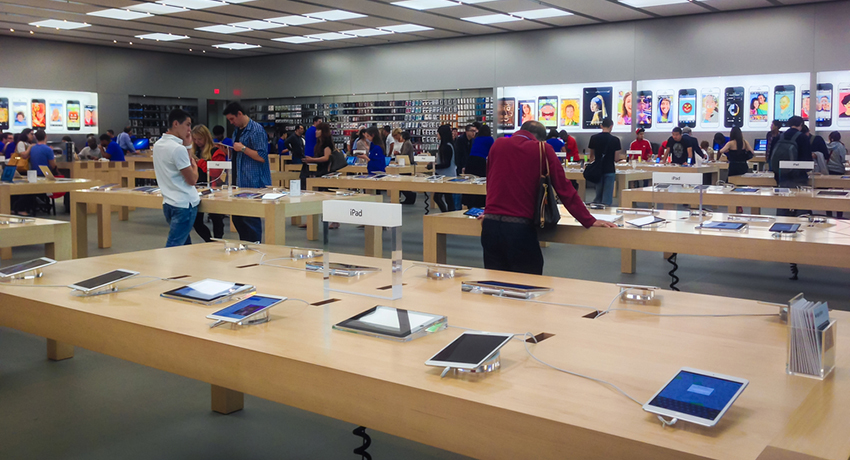Five Common Health Rumors, Debunked

Apple store image via Canadapanda / Shutterstock.com“>Canadapanda / Shutterstock.com
You use a computer eight hours a day at work. You send a text message every 15 minutes. You’re constantly checking your email, Facebook, Twitter, and Instagram. You listen to your iPod to and from work. To make a long story short, technology is a major part of every day life—but it could also be a major threat to your health.
The rumors about technology causing health problems are always swirling, but it’s hard to know which are valid, and which are just scare tactics. We broke down five of the most common myths so you can stop looking like a crazy person on your Bluetooth.
Rumor: Listening to music causes hearing loss.
Reality: Your mother was right on this one, but it’s preventable.
Dr. Ackland Jones, a senior audiologist at Massachusetts Eye and Ear Infirmary, confirms that listening to music, whether through earbuds or traditional headphones, can be damaging. Jones says that, over an eight-hour day, the recommended volume is 85 decibels; going up to 88 decibels cuts the recommended listening time in half. “Loud sounds can damage the delicate hair cells in the inner ear, which cannot be replaced in humans, resulting in a permanent hearing loss and frequently [ringing in the ears],” Jones says. “Noise-induced hearing loss is preventable by monitoring your listening levels and wearing hearing protection in noisy environments.”
Rumor: Laptops are bad for reproductive health.
Reality: Research does show a connection, especially for men.
While research about laptops is ongoing, Dr. JoAnn Manson, chief of preventative medicine at Brigham and Women’s Hospital, says laptops do look to be a threat to male reproduction. “In men, the concern is that laptops held on the lap and close to the testicles may adversely affect sperm quality by two separate mechanisms: excess heat and exposure to radio-frequency electromagnetic waves,” she says, adding that laptops can increase sperm temperature by up to four degrees, which compromises quality and mobility. “These concerns provide support for avoiding close contact between laptops and genitals. Keep laptops on a table or desk or use other barriers, and consider a cooling unit if your laptop generates heat.” In other words, just use your computer at your desk instead of in bed. You know who are you are.
Rumor: Looking at screens all day damages your eyesight.
Reality: Not really.
After a long workday, your eyes probably hurt from staring at a computer. But Dr. Matthew Gardiner, director of emergency ophthalmology services at Massachusetts Eye and Ear Infirmary, says that’s about the only consequence of screen use. “There’s no damage that will occur to the internal aspect of the eye; it doesn’t do anything to the lens or the retina or any optic nerve,” he explains. “But there’s no question that if people spend eight hours a day sitting in one chair, staring at the screen at the same distance, not getting up to take breaks, not consciously blinking and looking away from the screen, they will feel uncomfortable.”
Rumor: Typing and texting can cause carpal tunnel.
Reality: It’s just a myth.
Carpal tunnel, or pressure on nerves in the hand that leads to numbness, pain, and loss in function, is often associated with typing or texting, but Dr. David Ring, chief of hand and upper extremity services at Massachusetts General Hospital, says it shouldn’t be. “Somehow [carpal tunnel] got mixed up in a new illness termed repetitive strain injury, which is essentially pain with use of the hand, particularly [from] typing,” he says. “At this point it’s fair to say that the idea that carpal tunnel syndrome is pain with typing is a myth. As with most myths, it may take a generation to change the way our culture thinks about this, maybe longer.” So if you’re feeling pain after typing or texting, don’t panic—chances are you simply have old fashioned writer’s cramp.
Rumor: Cell phones cause cancer.
Reality: Researchers aren’t sure yet, but signs point to no.
The main concern about cell phone use is that mobile phones release a type of electromagnetic radiation called radiofrequency energy. Radiation has been linked with cancer before, but the type of radiation emitted by cell phones, unlike the carcinogenic variety, does not cause damage to DNA, leading experts to believe it is safe. While research is ongoing, there has not yet been any proof of higher cancer risk, and organizations like the American Cancer Society, the Mayo Clinic, the National Institute of Environmental Health Sciences, and the U.S. Food and Drug Administration take the position that research is not yet conclusive enough for worry.


